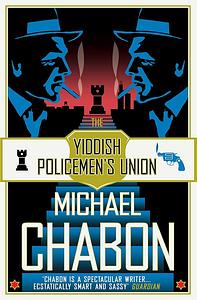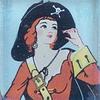Take a photo of a barcode or cover
8/10
De westelijke hemel achter hem was een en al marmelade en rook. Naar het zuidwesten ging de volle maan al vroeg onder, strak afgetekend en grijs als een scherpe zwarwitfoto van zichzelf die op de lucht geplakt zat.
Of:
Zijn smalle trouwring zat in zijn vinger begraven als een bijl in een boomstam. Litvak voelde zijn hart in zijn keel bonken alsof er met een duim aldoor aan de laagste snaar van een harp werd getokkeld.
En ga zo maar door, 400 pagina's lang.
Ik hou er van.
De westelijke hemel achter hem was een en al marmelade en rook. Naar het zuidwesten ging de volle maan al vroeg onder, strak afgetekend en grijs als een scherpe zwarwitfoto van zichzelf die op de lucht geplakt zat.
Of:
Zijn smalle trouwring zat in zijn vinger begraven als een bijl in een boomstam. Litvak voelde zijn hart in zijn keel bonken alsof er met een duim aldoor aan de laagste snaar van een harp werd getokkeld.
En ga zo maar door, 400 pagina's lang.
Ik hou er van.
The prose is so rich and intricate that it can be a little overwhelming at times. However I thoroughly enjoyed the style and story. The characters felt incredibly real and the detail and texture in the world was just so much fun to be thrown into.
OK, first a disclaimer: I did not finish this book; i got about 2/3rds of the way there and gave up. Now, I was a fan of Chabon; in particular i loved the funny and offbeat Wonderboys - I'd go so far as to call it one of my all time favourite novels. But i was underwhelmed by his acclaimed Kavalier and Clay (K&C); I could see that it was well written and crafted but the story was just too depressing for me and the subject matter too removed from my own experiences that I struggled to care about it. I wanted to love the book, but it seemed like it wasn't really written for me.
Unfortunately I can say much the same about Yiddish Policeman's Union, only without the redeeming features that led me to finish and partially enjoy K&C. The story starts off in an interesting enough fashion (much like k&c) - its set in an alternative world where Israel failed and the Jews of the world sought refuge in a new semi- state in Alaska. This and other elements of the alternative history initially grabbed my attention. Unfortunately the book quickly moves beyond this premise to become focused on 3 main themes; Judaism, Chess and Noir mystery. This unfortunately comprehensively failed to keep my interested even despite my love for Noir fiction.
The biggest problem I have with the book is that it is unforgiving in its assumption of knowledge and attention to detail in Jewish culture and traditions. I know very little about Jewish culture, and I was very quickly lost in a world of alien phrases, cultural and religious references I had no knowledge of and characterisations that I could see were in someway lampooning stereotypes and archetypes but again ones I could not recognise. Then throw in the obsessions with chess that infuses the story and I'm sorry to say it rapidly became a tedious journey.
Perhaps I could have forgiven this and learnt much about a new culture, but the novel moves at a glacial pace and I found myself rapidly loosing interest in the characters and not caring one iota about the central mystery. All I seemed to be getting was more references to Judaism, Jewish culture and chess, padded out by a surprisingly clichéd take on the noir detective.
All in all, I was very disappointed by the book and I can't see myself ever picking it up again given how hard a slog and how unrewarding it was to get as far as I did. Like K&C, I can see that Chabon writes cleverly, eruditely and imaginatively. But despite him having written one of my favourite novels, I am sadly coming to the conclusion that he doesn't write enjoyably for me. Others may love this novel, perhaps it makes more sense to an American rather than a Brit, or perhaps you need to be more forgiving of being thrust into an alien world and always feeling like an outsider looking in. But as for me, I'm sorry to say I can't recommend this book and I am very much looking forward to getting rid of my copy as quickly as I can. I gave it 2 stars as Michael Chabon can write (I was tempted to give more for the same reason but I think 2 stars is a more honest reflection of how I felt about this book)
Unfortunately I can say much the same about Yiddish Policeman's Union, only without the redeeming features that led me to finish and partially enjoy K&C. The story starts off in an interesting enough fashion (much like k&c) - its set in an alternative world where Israel failed and the Jews of the world sought refuge in a new semi- state in Alaska. This and other elements of the alternative history initially grabbed my attention. Unfortunately the book quickly moves beyond this premise to become focused on 3 main themes; Judaism, Chess and Noir mystery. This unfortunately comprehensively failed to keep my interested even despite my love for Noir fiction.
The biggest problem I have with the book is that it is unforgiving in its assumption of knowledge and attention to detail in Jewish culture and traditions. I know very little about Jewish culture, and I was very quickly lost in a world of alien phrases, cultural and religious references I had no knowledge of and characterisations that I could see were in someway lampooning stereotypes and archetypes but again ones I could not recognise. Then throw in the obsessions with chess that infuses the story and I'm sorry to say it rapidly became a tedious journey.
Perhaps I could have forgiven this and learnt much about a new culture, but the novel moves at a glacial pace and I found myself rapidly loosing interest in the characters and not caring one iota about the central mystery. All I seemed to be getting was more references to Judaism, Jewish culture and chess, padded out by a surprisingly clichéd take on the noir detective.
All in all, I was very disappointed by the book and I can't see myself ever picking it up again given how hard a slog and how unrewarding it was to get as far as I did. Like K&C, I can see that Chabon writes cleverly, eruditely and imaginatively. But despite him having written one of my favourite novels, I am sadly coming to the conclusion that he doesn't write enjoyably for me. Others may love this novel, perhaps it makes more sense to an American rather than a Brit, or perhaps you need to be more forgiving of being thrust into an alien world and always feeling like an outsider looking in. But as for me, I'm sorry to say I can't recommend this book and I am very much looking forward to getting rid of my copy as quickly as I can. I gave it 2 stars as Michael Chabon can write (I was tempted to give more for the same reason but I think 2 stars is a more honest reflection of how I felt about this book)
As a big Michael Chabon fan, I was very excited about the release of this book. I definitely enjoyed it--the characters are great, the story is engaging, the alternate world where Jews have been relegated to Alaska in the late 40s makes for an interesting premise. But it was just very good, not quite great (more Wonder Boys than Kavalier & Clay). I put it down saying "Well that was nice," not "I'm so sad this book is over, I'll have to reread it like 20 times in a row now."
challenging
dark
emotional
informative
inspiring
mysterious
reflective
medium-paced
Plot or Character Driven:
Plot
Strong character development:
Yes
Loveable characters:
Complicated
Diverse cast of characters:
Yes
Flaws of characters a main focus:
Complicated
Ahoy there mateys! I know that there is cultural and historical context that I am missing but nonetheless this was brilliant. It won the Hugo Award for Best Novel (2008), Nebula Award for Best Novel (2007), and Locus Award for Best Science Fiction Novel (2008). I am pretty sure I bought the hardcover as soon as it came out but it sat unread but beckoning until this year. Part of the reason for the delay is because of the experience of reading Kavalier & Clay and how much it slayed me and part of it was knowing that I would have to be in a certain mood to confront it.
The blurb describes this as "a gripping whodunit, a love story, an homage to 1940s noir, and an exploration of the mysteries of exile and redemption." It is an alternate history that takes place in the Sitka District on the panhandle of Alaska. A Federal district was created in 1941 before the 1948 collapse of Israel and as a safe haven for Jews after the Holocaust. Now 60 years later, the state of Alaska is about to retake control of the territory. With that backdrop, Meyer Landsman and his half-Tlingit partner, Berko Shemets, are told to wrap up their caseload in whatever way possible before this Reversion takes place. But Landsman's neighbor has been murdered and he wants to solve the crime. Only nobody else seems to want him to.
I listened to the audiobook of this and was mesmerized. I know it is supposed to be made-up history but it felt so realistic and gritty. I did read the Wikipedia article about the book and its real life influences. The words are poetry and art. The story is thoughtful and compelling. I cannot really do the plot justice given the intricacies of character and the weaving of history. There is an otherworldly section to the novel that fit naturally into the story. And I am so glad I listened to the narration of the novel by Peter Riegert. Highly, highly recommended. Arrr!
The blurb describes this as "a gripping whodunit, a love story, an homage to 1940s noir, and an exploration of the mysteries of exile and redemption." It is an alternate history that takes place in the Sitka District on the panhandle of Alaska. A Federal district was created in 1941 before the 1948 collapse of Israel and as a safe haven for Jews after the Holocaust. Now 60 years later, the state of Alaska is about to retake control of the territory. With that backdrop, Meyer Landsman and his half-Tlingit partner, Berko Shemets, are told to wrap up their caseload in whatever way possible before this Reversion takes place. But Landsman's neighbor has been murdered and he wants to solve the crime. Only nobody else seems to want him to.
I listened to the audiobook of this and was mesmerized. I know it is supposed to be made-up history but it felt so realistic and gritty. I did read the Wikipedia article about the book and its real life influences. The words are poetry and art. The story is thoughtful and compelling. I cannot really do the plot justice given the intricacies of character and the weaving of history. There is an otherworldly section to the novel that fit naturally into the story. And I am so glad I listened to the narration of the novel by Peter Riegert. Highly, highly recommended. Arrr!
The narrator for this audiobook doesn't do a great job of distinguishing character voices, so unless it says "said Name" I can't easily tell who's speaking. The narrator also emphasizes accent over annunciation... I might try and read a physical copy, especially because I'm getting the names and plot mixed up from only listening to it
Fantastic speculative fiction novel by Chabon (author of the equally delightful yet completely different "The Amazing Adventures of Kavalier and Clay").
mysterious
slow-paced
Plot or Character Driven:
A mix
Strong character development:
Complicated
Loveable characters:
No
Diverse cast of characters:
No
Flaws of characters a main focus:
Yes
I absolutely loved Chabon’s Amazing Adventures of Kavalier & Clay and was hoping to rediscover some of that magic here – but it didn’t happen that way. Save for the extravagance and twists of characters and plotlines, Yiddish Policemen’s Union almost seemed like a different author. The soaring lyrics of his writing morphed into a choppy rhythm that did, to be fair, match the novel’s subject and made its tone work. I just didn’t like it as much.
And I also felt like I wasn’t the right audience for this book, with its constant references to Judaism and Jewish culture. Words and names didn’t resonate with me and rarely caught my imagination in the way Kavalier & Clay had. I couldn’t pay attention and get absorbed in the story, because it wasn’t for me. It’s really just too bad.
And I also felt like I wasn’t the right audience for this book, with its constant references to Judaism and Jewish culture. Words and names didn’t resonate with me and rarely caught my imagination in the way Kavalier & Clay had. I couldn’t pay attention and get absorbed in the story, because it wasn’t for me. It’s really just too bad.
funny
mysterious
tense
slow-paced
Plot or Character Driven:
Character
Strong character development:
Yes
Loveable characters:
Yes
Diverse cast of characters:
Yes
Flaws of characters a main focus:
Yes
You need to be okay with this being only slightly about a murder. As such, my enjoyment vacillated wildly with this, because I kept needing to acclimate to whatever this was. Sometimes it felt more like a character study of a historical-ish, American Jew. Where everything feels like insider knowledge or a nod I never really got, knowing absolutely nothing about Jewish culture, save what I’ve read in fiction.
It feels pretty noir though, so not that far removed from a murder mystery, but literary; even more adjacent to it than typical? He gets really beat up, he loses practically everything. It’s not “about” what he thinks it’s about. And again, even the death is about Jewishness.
I think it does come together in the end though, if you’re able to let it do its things, which does feel pretty singular. Not entirely wanting to do any one thing, save for the character work. Either that’ll be enough, or it won’t. For me, I was picking up what it was dropping down, and I love pie, so there’s that. (If you read it you will get the pie thing).
It feels pretty noir though, so not that far removed from a murder mystery, but literary; even more adjacent to it than typical? He gets really beat up, he loses practically everything. It’s not “about” what he thinks it’s about. And again, even the death is about Jewishness.
I think it does come together in the end though, if you’re able to let it do its things, which does feel pretty singular. Not entirely wanting to do any one thing, save for the character work. Either that’ll be enough, or it won’t. For me, I was picking up what it was dropping down, and I love pie, so there’s that. (If you read it you will get the pie thing).




